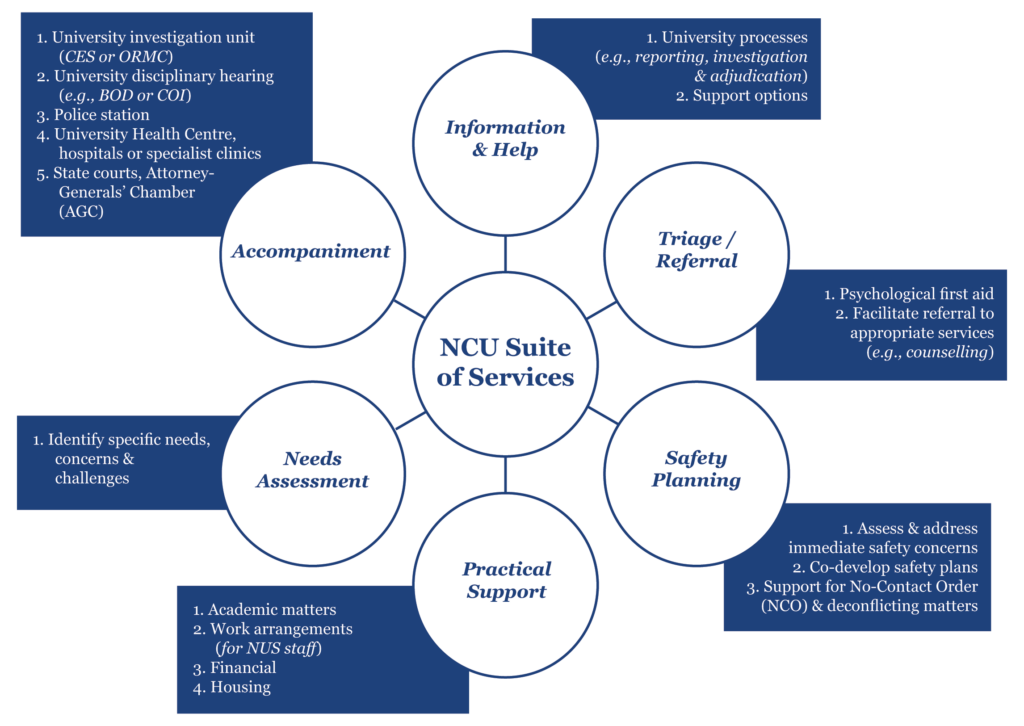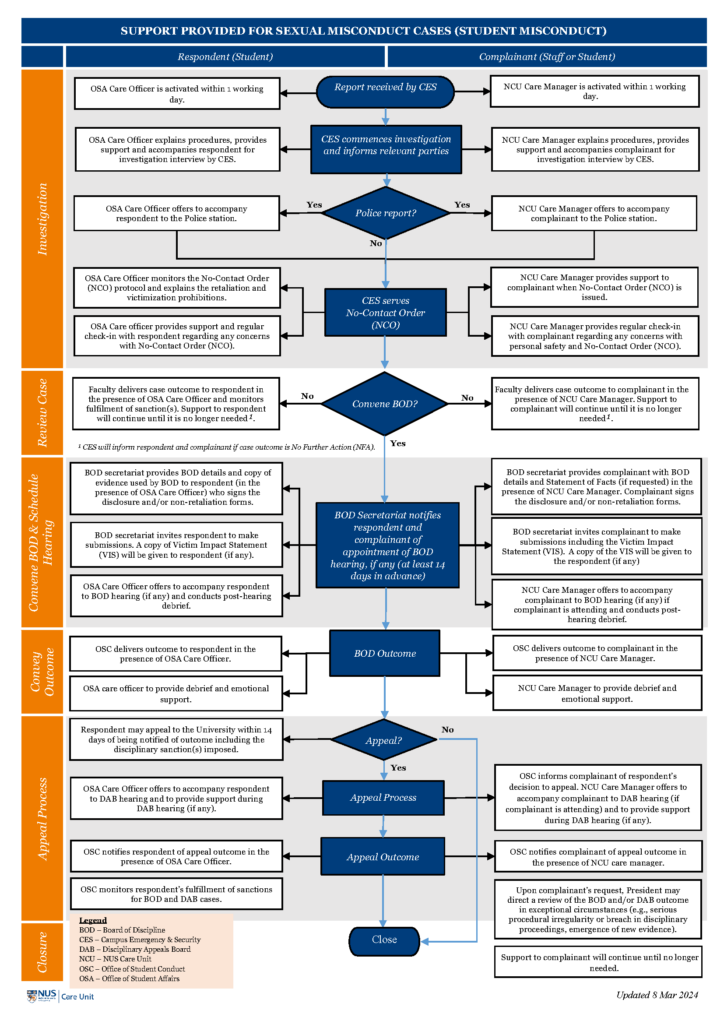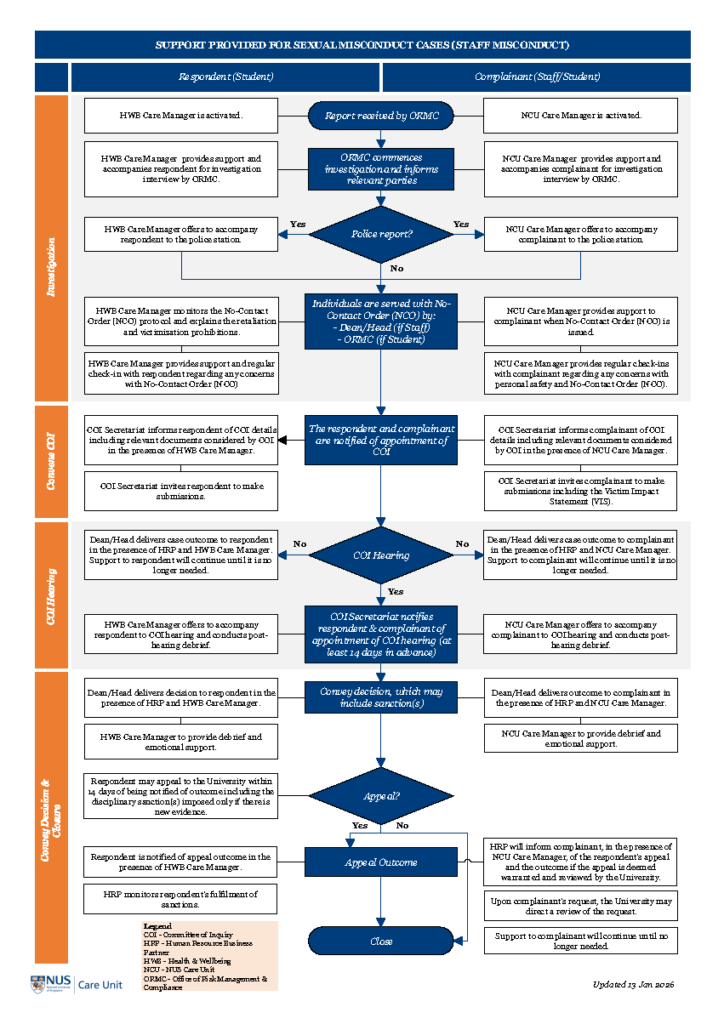Get Help
Learn about your options
immediate help
If you are in immediate danger, call +65 6874 1616 for Campus Emergency & Security (on-campus) or 999 for the Police (off-campus).
If you are injured or want immediate medical treatment, call 1777 for a non-emergency ambulance or 995 for an ambulance, or go directly to the nearest hospital.
immediate self-care
For many victim-survivors of sexual misconduct, what happened to them was traumatic. However, no two persons respond to trauma in exactly the same way. Additionally, when one experiences the effects of trauma vary from person to person – while some experience them soon after the event, others may only feel its effects some time after.
Knowing the signs and symptoms of trauma may help you recognise the need for you or someone you know to seek proper care and support from someone. Here are some examples:
physical
- Fatigue
- Muscle aches or tension
- Feeling sick such as nausea or vomiting
- Rapid heart rate
- Elevated heart pressure
- Self-harm or self-harm urges
cognitive
- Confusion
- Insomnia or nightmares
- Flashbacks
- Poor concentration or dissociation
- Difficulty remembering
- Difficulty making decisions
emotional
- Denial
- Panic attacks and anxiety
- Low mood, feeling upset or easily irritable
- Self-blame, guilt or shame
- Emotional numbness and detachment
- Depression
behavioural
- Changes in sleep patterns
- Changes in appetite
- Hypervigilance
- Social withdrawal
- Difficulty trusting people
- Avoiding certain places
- Misuse of substances like alcohol
notice some of these signs in your friend or loved one?
If you suspect or know that your friend or loved one had experienced such an incident, here are some ways that you can help.
notice some of these signs in your friend or loved one?
If you suspect or know that your friend or loved one had experienced such an incident, here are some ways that you can help.
What you can do to help yourself
Just as proper care aids in the healing of wounds in our bodies, so too can we help our bodies recover from traumatic experiences. Here are some tips:
be accepting of your feelings
What you are feeling is a normal reaction to trauma. Take your time to recognise and process it.
live healthy
Eat healthy foods, get sufficient sleep, exercise regularly, and avoid alcohol.
Spend time with loved ones
It is important that you maintain your relationships with close ones, especially in times of crisis.
Speak to trusted individuals or join a support groups
It is comforting to receive physical and emotional support from other people.
Find ways to relax & remain active
Engage in leisure activities or interests such as taking walks, listening to music, and practising yoga or meditation.
Familiar routes can be very comforting
Continue with your regular routine or try to return to it, if possible.
Defer major decisions
Postpone making major decisions or major life changes to a later time when you are more ready for them. Judgement tends to be more objective and satisfying when they are made then.
Seek professional help
A trained care professional is someone who works in close partnership with you to personalise a range of support you may need.
You are not alone. let us help.
We support NUS students and staff affected by sexual misconduct, including bystanders and witnesses.

When to seek help
People recover from trauma in different ways and at different paces. However, if you are experiencing a particularly distressing reaction, such that it impedes your daily functioning or does not seem to recede with time, it is highly advisable that you seek professional help.
You can still seek help early on well before any stress symptoms develop in frequency and intensity.
Traumatic incidents can trigger a psychological response in people who experience it. This response is normal and may manifest in different forms, including physical, emotional, cognitive, or behavioural changes.
There is no right or wrong way to react after a traumatic incident. Knowing the signs and symptoms of psychological trauma may help you recognise the need to seek proper care and attention from someone (e.g., friend, family, care professional).
Just as proper care aids in the healing of wounds in our bodies, so too can we help our bodies recover from traumatic experiences. Here are some tips:
- Be accepting of your feelings. What you are feeling is a normal reaction to trauma. Taking your time to recognise and process it can be an effective way of overcoming your fears or worries.
- Live healthy. Eat healthy foods, get sufficient sleep, exercise regularly, and avoid alcohol. Maintain a balanced diet with plenty of water intake.
- Spend time with your loved ones. It is important that you maintain your relationships with close ones, especially in times of crisis.
- Speak to trusted individuals or join a support group. It is comforting to receive physical and emotional support from other people.
- Find ways to relax and remain active. Engage in leisure activities or interests such as taking walks, listening to music, and practising yoga or meditation.
- Familiar routes can be very comforting. Continue with your regular routine or try to return to it, if possible.
- Defer major decisions. Postpone making major decisions or major life changes to a later time when you are more ready for them. Judgement tends to be more objective and satisfying when they are made
- Seek professional help. A trained care professional is someone who works in close partnership with you to personalise a range of support you may need.
People recover from trauma in different ways and at different pace. However, if you are experiencing a particularly distressing reaction, such that it impedes your daily functioning or does not seem to recede with time, it is highly advisable that you seek professional help.
Please note that you can seek help early on well before stress symptoms develop in frequency and intensity.
support options
If you think you have experienced sexual misconduct, including sexual harassment, stalking, relationship violence, or sexual assault, then you may want to consider a variety of resources for helping you. These are broadly available in two categories:
- NCU Options
- Other Support Options
In most cases, the only difference between these two categories is whether you want a trained care professional to journey with you through the process.
You should carefully consider these options based on your needs and preferences. It is normal to feel alone, confused, and even resentful of having to make decisions under these challenging circumstances. It may seem like you have lost control over your life and that it may never be restored. By relying on the resources that you already have — for example, your social support network and coping skills — and the wider support system at NUS or externally, you can regain a sense of hope and control in your life.
There is no right or wrong way to access support options. This includes when you choose to do so. However, we encourage you to speak to someone, including a friend or close one, and/or seek counselling support on-or off-campus.
NCU support
Navigating the various organisational, investigative, and care support systems can be extremely stressful for individuals. We are here to help.
The NUS Care Unit (NCU) has a dedicated team of trained professionals with experience in supporting individuals who have been sexually victimised. Our Care Managers (CMs) are committed to providing personalised and coordinated care for clients to receive the support they need. There are six main dimensions to our care work, as shown here.
*Click on the image to enlarge it.
other on-campus support
You may access support and services provided on campus or with an external community provider. Below are some options:
Lifeline NUS
For students facing life threatening psychological emergencies to seek immediate help and support.
- 24-hour hotline: +65 6516 7777
University Counselling Services (UCS)
UCS provides an opportunity for you to connect with a mental health professional who is trained to help you with your concerns.
- UCS Website
- Hotline: +65 6516 2376
- Email: uhc_counselling@nus.edu.sg
Other On-Campus Support
You may access support and services provided on campus or with an external community provider. Below are some options:
NUSHeart (*for NUS Staff only)
NUSHeart consultations are free for NUS employees and their dependents.
- Intellect app (see instructions)
- 24-hour toll-free hotline: 800 852 6317
- For an in-person session, make your request at: support@intellect.co
Faculty Student Support Managers (SSMs)
In each faculty, students will have direct access to a designated Student Support Manager (SSM) who can support, guide and connect them to the available resources on campus.
- Click here for a full list.
Residential Staff
Works closely with relevant partner Offices to enhance the residential life experience of students on campus. They ensure residential life standards and discipline, oversee students’ welfare, and promote an active residential life.
- Please contact your designated Residential Fellow, Advisor or Master.
Student Wellness Managers, Office of Student Affairs (OSA)
Student Wellness supports your well-being as you journey through NUS by educating you about self-care management, support your emotional needs, and/or lending you a listening ear.
- Email: studentwellness@nus.edu.sg
Off-Campus Support
AWARE Sexual Assault and Care Centre
SACC provides safe, free and confidential services for individuals who have faced sexual harassment and/or assault.
Project StART by Care Corner
Care Corner is one of the three Family Violence Specialist Centres (FVSCs) in Singapore. As part its family protection intervention work, Project StART also supports persons who have experienced sexual assault, particularly by spouse and dating partner.
- Hotline: +65 6476 1482 (weekdays, 10 AM – 5 PM)
- Email: projectstart@carecorner.org.sg
National Anti-Violence & Sexual Harassment Helpline (NAVH)
The National Anti-Violence & Sexual Harassment Helpline (NAVH) is a dedicated helpline for calls related to abuse and violence, including sexual-related abuse and violence.
- Helpline: 1800-777-0000
- Online Form
Samaritans of Singapore (SOS)
SOS provides confidential emotional support for people facing a crisis.
- Samaritans of Singapore (SOS) website
- 24-hour Hotline: 1-767
- Email: pat@sos.org.sg
Family Service Centres (FSCs) by the Ministry of Social and Family Development (MSF)
Family Service Centres (FSCs) are community-based resources that can help and support individuals and families cope with their personal, social and emotional challenges.
- Hotline: 1800 222 0000
- Click here to find FSCs near you.
If you or someone you know has experienced online sexual harassment and are not sure what to do, Solid Ground – an independent, volunteer-run project – offers step-by-step guides on the possible actions you can take based on what describes your situation.
More information can be found on the Solid Ground website.
Medical Options
Medical resources provide advice, diagnosis, treatment, follow-up, and referrals for medical issues related to sexual and/or relationship-related violence. In addition, they care for physical injuries and can test for sexually transmitted infections (STIs) and pregnancy.
University Health Centre (UHC)
UHC is a one-stop Centre that provides students with a wide range of services, from routine health examinations to managing acute and chronic illnesses.
- Hotline: +65 6601 5035
Department of STI Control (DSC)
Provides counselling, education and testing for sexually transmitted infections (e.g. HIV).
- Hotline: 1800 252 1324
Pregnancy Crisis & Support
- 24-hour Hotline: +65 6339 9770
For more information on seeking medical attention, click here.
Reporting Options
There are several channels for filing a report of alleged sexual misconduct. You can pursue one or more options for reporting an instance of alleged sexual misconduct—filing a disciplinary complaint under the University’s Code of Conduct for Students and Staff regarding sexual misconduct [1] AND/OR filing a police report. Alternatively, you may wish to speak to an NCU Care Manager (CM) who will explain more about these options.
On-Campus Options
In most cases, the decision to proceed is yours. However, in some circumstances (e.g., where the misbehaviour is an arrestable offence [2]), NUS may be obligated to file a police report even if you may not be ready. This would be discussed with you in advance, and NUS would ensure that you have support throughout the process.
A general timeframe of the NUS investigation and adjudication process can be found below:
Support will be offered at each juncture of the reporting, investigation and adjudication process:
Campus Emergency & Security (CES)
The main investigation unit for incidents related to sexual misconduct [2] involving a student from NUS.
- 24-hour Hotline: +65 6874 1616
- Email: ces@nus.edu.sg
- Integrated Crime Management System (ICMS) e-Report | (Access Guide)
Office of Risk Management and Compliance (ORMC)
The main investigation unit for incidents related to sexual misconduct [2] involving a staff from NUS.
- Hotline: +65 6516 6209
- Email: whistleblow@nus.edu.sg
Following a report, the respective NUS investigation authority may seek the injunction of a No-Contact Order (NCO) [3] on both the reporting party as well as the accused while investigation happens. This is to preserve the integrity of the evidence and to protect you from influence or harm from the other party.
Off-Campus Options
Singapore Police Force
- 24-hour Hotline: 999
- SPF e-Report [*Requires a SingPass account]
- For an overview of SPF’s reporting and investigation process, click here.
What If I Don't Want to Do Anything Now?
There’s no right or wrong way to access the abovementioned support options. This includes when you choose to do so. However, we encourage you to speak to someone whom you trust, including a friend or a close one.
Footnotes
[1] Sexual Misconduct is a general term used in this Code of Student Conduct and Code of Conduct for NUS Staff to refer to a range of acts of a sexual nature committed against a person by force, intimidation, manipulation, coercion or without that person’s Consent, or at a point when that person is incapable of giving Consent.
[2] Section 424 of the Criminal Procedure Code states that:
“every person aware of the commission of or the intention of any other person to commit any arrestable offence punishable shall … immediately give information to the officer in charge of the nearest police station or to a police officer of the commission or intention.”
[3] NCO is a No-Contact Order issued to one or more parties involved in disciplinary investigations or proceedings for a sexual misconduct offence. Persons subjected to NCO must not be subjected to any acts of retaliation, harassment, threats, intimidation and coercion.
- Home
- Get Help
NUS Care Unit
- University Health Centre,
- 20 Lower Kent Ridge Road,
- #B1-09, Singapore 119080
- For general enquiries:
- +65 6601 3155
- ncu_admin@nus.edu.sg
- Office hours:
Monday - Friday: 9am - 5pm - Website Feedback





